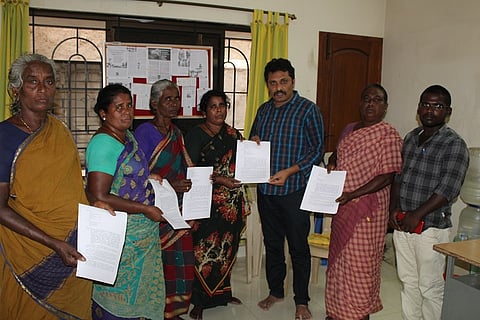

56-year-old Karuppiah, a resident of Melavalavu village in Madurai has barely slept the last week. The Dalit man who works as a clerk in a Judicial Magistrate court in the district has been plagued by flashes of an afternoon from 22 years ago - when he saw the body of his brother Murugesan strewn on a public road, flanked by the corpses of five other men from his community.
And the trigger for the nightmares, he says, is the release of 13 convicts responsible for these murders on November 9. The men all belong to the dominant Thevar community and their release was approved by the Tamil Nadu government and signed by the Governor, as part of the MGR centenary celebrations. And while the caste Hindus, with 5000 familes in the village rejoice this decision, for the 150 Dalit families that faced unimaginable violence in 1997, all sense of security has been replaced with dread.
The brutal caste crime
Karuppiah recalls getting down at the Melur bus stop on June 30, 1997, to a scene of pandemonium and terror. His aunt was the first familiar face that he saw, and she came running to him, tears streaking her cheeks.
"She looked at me and screamed, 'I kept telling him not to run for Panchayat President, now see what has happened'," says the clerk. "I couldn't clearly understand what transpired. But the police there filled me in as they guided me to the scene of crime," he adds.
At close to 3pm, in broad daylight, men from the dominant community had murdered six Dalit men, including Murugesan, who were returning by bus to the village from Madurai city. While Murugesan was the Panchayat Chief of Melavalavu, the other victims were functionaries. For close to a year by then, caste Hindus from the village had been angry because the Melavalavu Panchayat was declared as reserved for Scheduled Caste and Scheduled Tribe (SC/ST) members.
"They had already done everything possible to stop the elections from October 1996," says Karuppiah. "First they unleashed violence on the Dalit community when my brother decided to contest and burnt three houses when he filed his nomination papers. The election had to be cancelled and rescheduled. The second time, they attempted to capture booths and when that was stopped by authorities, the Thevars boycotted the elections," he adds.
And for the first time in Melavalavu, members of the Scheduled Caste took top positions in the Panchayat. But the fight had only just begun.
"The Thevars refused to allow our people to use the Panchayat office," alleges Karuppiah. "So they were forced to use one small room in the police station as their office," he adds.
Murugesan's wife Manimekalai meanwhile tells TNM that despite winning the election, the death threats to her husband did not stop.
"They kept telling him to step down and threatened to kill him," she says. As a result Murugesan wrote petitions to the local police and even to then Chief Minister M Karunanidhi, asking for protection. But according to Evidence, an anti-caste NGO based out of Madurai, the security was never provided. "He had even gone to the district collector to ask for protection for the Dalit community," adds Manimegalai.
And it was on that very day, while returning from the Collectorate, that Murugesan and his colleagues were attacked. The nature of the murder, removed any doubts about its motive.
The beheading
"The men said, 'Thala irundha dhaane da thalaivar aaguve nee' (You can only be a leader sif you have a head') before beheading my brother," says Karuppiah. "While the others were murdered right there, we found Murugesan's head half a kilometre away in a well," he adds.
Manimegalai says her husband took up the post despite the dangers involved because he wanted to make a difference.
"He said he will open schools in our villages and make sure Dalit families have pucca houses," she recalls.
44 people were initially accused in the case, but this was weaned down to 17 men led by a man named Alagarsamy. They were sentenced to life imprisonment by trial court, and the order was upheld by the Madras High Court and the Supreme Court in 2009. While one of the convicts died, three were given remission and released during Anna centenary celebrations in 2008 by the then DMK government.
Despite the apex court dismissing the convicts’ appeals thrice in the past, AIADMK's Melur district MLA Periyapullan sought for their release in the state Assembly in January 2019.
'Why release them?'
"Despite the gravity of their crimes, two governments have decided to release them," says Kathir, the founder of Evidence. "It sets a very bad precedent and the opinion of the affected families should have been recorded," he adds.
Family members have now sent a petition to the Tamil Nadu Home Secretary and Chief secretary, demanding that the release of the men be withdrawn.
"The timing of it has been very suspect," says Kathir. "They released these men right before the Ayodhya verdict, ensuring that our attention was not on this. This is a completely political move," he adds.
Karuppiah echoes the sentiment.
"They have done this just for their own vote bank and to get favour amongst the Thevar community," he alleges. "But this is all at the cost of human life. Us Dalits, will have no peace here anymore. Every day we will wonder - Is today the day they will strike back?"